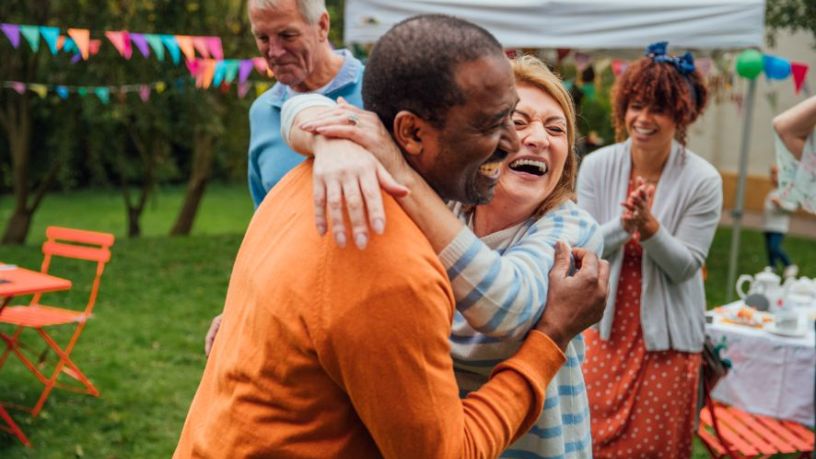Taking the time to look after yourself is essential when you’re caring for someone with dementia.
Key takeaways
You can try using photos and music to bring back memories and spark a conversation.
Technology can help make life easier, grounding your loved one in the present and allowing you to monitor them.
Caring for someone with dementia can be mentally and physically exhausting.
These practical tips may help you if you’re looking after or in close contact with someone who is living with dementia.
1. Look after yourself
Many people who find themselves in the role of carer often put the needs of others before their own. But it’s essential to take for yourself too.
“If you don’t look after yourself, then who is going to look after your loved one?” says Professor Graham Stokes, a clinical psychologist with over 30 years’ experience in dementia care.
Eating healthy food, taking regular exercise and getting plenty of sleep can all make a big difference to how you feel.
“It’s not selfish to look after your own health and wellbeing. Think of it as putting on your own oxygen mask first on the plane, before helping others.”
2. Take time out
It’s vital to take time out, away from the person you’re caring for, so you don’t burn out.
For many carers the idea of having time to yourself may seem out of reach. However, it’s important not to wait before seeking help.
Consider asking another relative to share some of the caring responsibilities. Depending on your circumstances, you may also be able to access residential respite care at an aged care home. This could be for a few hours, a full day, or longer periods.
3. Look at the person, not the dementia
Caring for someone living with dementia can be challenging, but also rewarding. Focusing on what a person likes and dislikes can help you create meaningful moments and improve their quality of life.
This approach is called ‘Person First’, and is the model used in Bupa Aged Care homes. It focuses on the person, considering their wellbeing, life experiences, needs and feelings when tailoring their support and care.
Try creating different experiences or activities the person enjoyed in the past. You might do this through music or looking at photos. This can help create happy moments or bring back special memories.
4. Keep conversation simple
Trying to understand the needs of someone living with dementia can be challenging. To make things as easy as possible, keep conversation short, straightforward and relevant.
“Using closed questions which require a ‘yes’ or ‘no’ answer can be helpful,” says Professor Stokes. “Avoid long stories to prevent overwhelm. It can be comforting for people with dementia to reminisce or talk about memories from the past.”
5. Use technology around the home
Technology can help both carers and those living with dementia manage everyday tasks.
There’s a range of available modified equipment. This includes:
- clocks to help distinguish night and day
- phones with voice prompts and reminders
- games and puzzles to help encourage conversation
- personal trackers to monitor a person’s location.

At Bupa, trust is everything
Our health and wellbeing information is regularly reviewed and maintained by a team of healthcare experts, to ensure its relevancy and accuracy. Everyone's health journey is unique and health outcomes vary from person to person.
This content is not a replacement for personalised and specific medical, healthcare, or other professional advice. If you have concerns about your health, see your doctor or other health professional.
You might also like...
Dementia: Tips to help people reconnect with past passions
As dementia progresses some people may lose the ability to do the things they once loved. With some help, we can support them to reconnect with past passions.
The importance of staying social as you get older
Having a good social life is fun, but did you know it can also be important for mental health too?
Breathing exercises to reduce stress and anxiety
Discover easy breathing exercises to reduce stress and anxiety. Mindful breathwork can help calm your mind, boost focus, and support mental wellbeing.
4 ways to prevent carer burnout
Being a carer can take its toll, and it’s important to find ways to look after yourself. Discover how you can help prevent burnout with 4 helpful tips.





